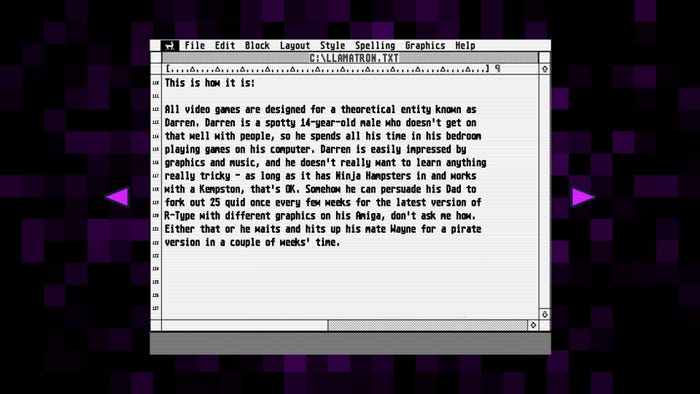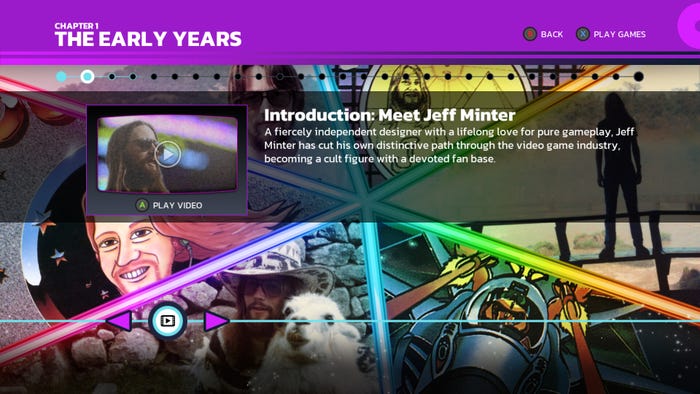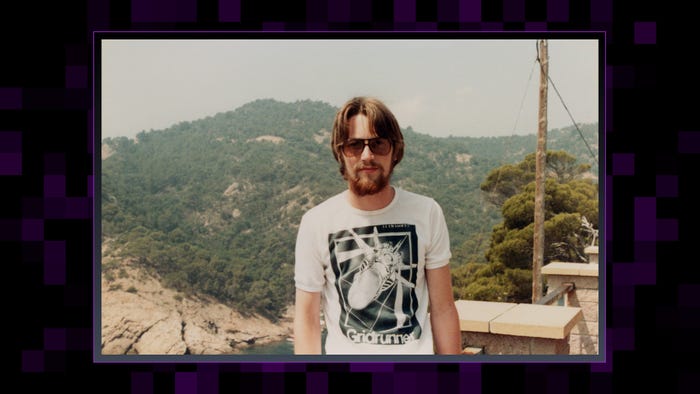[ad_1]
Jeff Minter has developed video video games nearly completely by himself for his 43-year-and-counting profession. However that doesn’t imply the 61-year-old British creator of arcade-inspired classics like Tempest 2000 and really bizarre fare like Area Giraffe is an isolationist.
A lot the other, actually. The primary 15 years of his profession have been laid naked on this week’s Llamasoft: The Jeff Minter Story, an interactive, game-filled museum for PC and consoles. It’s stuffed with interviews, documentation, prototypes, and extra, nevertheless it additionally clarifies why he’s a really exceptional recreation maker: his investments in relationships together with his gamers.
Talking to Minter on the eve of the compilation’s launch, the theme of relationships comes up fairly a bit, albeit humbly. Minter smirks from his house and farmstead in Wales as he calls himself a creator of “digital narcotics,” although he’s not fascinated with getting anybody addicted.
He factors to a real and “euphoric” hope for anybody who performs his distinctive model of video games: “All I need to do is put goodness into the world,” Minter says. “To make individuals really feel completely happy, to not make them really feel pissed off and get a rating, something like that. You recognize, in a means, the sport nearly falls away while you’re inside that area, and also you’re simply doing a factor which feels fantastic.”
A peek on the compilation’s 34 playable video games, all made in lower than 15 years, makes that high quality obvious. Minter’s work typically resembles a hallucinogenic interpretation of a stereotypical Nineteen Eighties arcade–all lights, flashes, bleeps, and bloops, with a shade palette similar to space-themed arcade carpet–solely to go away gamers sucked into approachably frenetic weirdness.
And it’s all indelibly Minter: his means to distort and twist acquainted arcade ideas into new shapes; his care to present gamers simply sufficient info and rationalization to know what they’re in for, whereas in any other case hiding loads of surprises; and his propensity to sneak llamas, sheep, and different “beasties” into each recreation.
Everybody says it, and it’s true: there’s no mistaking a Minter recreation for anybody else’s.
Jeff Minter’s video games one-of-a-kind video games come from a one-of-a-kind developer
But that’s not Minter’s day by day countenance–not even shut. His hair is skinny, lengthy, and knotty, draped previous thick glasses and an enormous, expressive smile, like he’s about to select up a shift delivering natural produce in a van. His selection of sweater is fuzzy and comfy, an ideal match for the spot of tea delivered to him throughout our chat by his longtime companion Ivan “Giles” Zorzin, each domestically and professionally. (“Thanks, sweetie,” is his immediate response.) And with a voice that resembles a calmer, extra composed Ozzy Osbourne, Minter by no means misses a possibility for dry humor, all whereas being conceited sufficient to remark about something–even a failed burp try between feedback on VR and augmented actuality.
In parsing his seemingly opposite traits, you may higher view his quest for optimistic and euphoric experiences as one thing quiet, transcendental, and even meditative. That’s the tone Minter establishes whereas speaking in regards to the fandom and relationships his video games have fostered.

From usually assembly followers in individual (“we’d go to pubs, hire a spot out, play video games”) to having his livelihood repeatedly saved by well-placed admirers (“numerous individuals who had been keen on Llamasoft helped push my profession on in instructions which enabled me to maintain going”), Minter has no scarcity of life-changing connections underneath his belt–even whereas he’s clear that, positive, he enjoys a sure form of solitude. If another person will help him with enterprise, engine growth, and different duties, he will be “utterly free to sit down on my ass and write video games all day.”
The essential factor about Llamasoft: The Jeff Minter Story is its throughline: Minter’s relationships together with his gamers. Minter admits as a lot in a delicate, barely anxious means.
“I hope individuals do not rush by [the compilation] an excessive amount of,” Minter says. “I hope they’re going to give every recreation slightly little bit of time. I hope it doesn’t undergo an excessive amount of from what I name ‘emulator syndrome,’ the place you put in an emulator on a machine, then you definitely put a bunch of ROMs [digital copies of games] on there, after which you will have 5 minutes on this, 5 minutes on that, 5 minutes on that. You do not actually get the total taste of any of them.”
What he means turns into evident after poring by this week’s new compilation, as produced by writer Digital Eclipse as a part of its “Gold Grasp” collection. Like the 2 different Gold Grasp entries up to now, which centered on Atari’s early period and Jordan Mechner’s seminal Karateka, respectively, L:TJMS shuffles playable video games right into a museum-like presentation. The place this launch differs from different Gold Grasp compilations is its emphasis on serving to new followers linger with every Llamasoft relic a bit longer.
Watching a mastermind evolve
The primary signal of this distinction comes within the quantity of phrases. As Minter begins to realize confidence and even swagger in his work–with a whopping 17 completely different video games revealed for British PCs by the top of 1982–his writing ramps up. The compilation contains many problems with his “Nature of the Beast” fan e-newsletter, which he started distributing in 1984. His video games’ instruction manuals (additionally reprinted on this compilation) quickly tackle the identical unfiltered, conversational format: how video games had been made, what Minter has been as much as, plans for future video games, favourite bands, the sturdiness of common pc joysticks, and even his frustrations with an more and more commercialized “business” for gaming.

Picture through Digital Eclipse/Atari.
Across the similar time, phrases start to fill his video games, as effectively–which, for the uninitiated, resemble the action-forward likes of Robotron and Defender, not text-filled RPGs. The longer you play any Minter recreation, the extra pop-culture references, manic cries, and foolish non sequiturs seem on display between every zap of a laser. On this means, Minter subliminally connects his worldview together with his gamers the longer they interact with any of his video games, even when he describes among the phrases as “what jetsam is floating about in my mind.”
Minter’s childhood pursuits landed midway between English research and science. “I’ve at all times preferred enjoying with phrases,” he says. “If I hadn’t been a programmer, I’d have fairly loved being a linguist. I benefit from the etymology of phrases and finding out how they match collectively.” A few of his earliest reminiscences embody each of his British dad and mom taking over “open college programs”–schooling at house, effectively earlier than that was the 2020s norm–and absorbing what every delivered to the home. His mom was a multifaceted employee (nurse, secretary, and extra), whereas his father finally grew to become an engineer on the UK’s Atomic Weapons Analysis Institution. The latter take-home curriculum was a bit extra concerned and attention-grabbing.
Minter recollects his first time seeing a pc in individual. He was 9 years outdated, and his father Patrick had a scheduled block of terminal entry at a “time sharing place”–about the one method to publicly entry computer systems within the early ‘70s. After expressing his dismay that this pc didn’t resemble the stuff of sci-fi, capable of reply any query about “life, the universe, and every part,” Minter’s father countered: “A pc solely is aware of as a lot as you inform it.”
Lower than a decade later, Minter took that perception to the following stage after seeing a fellow faculty pupil enjoying an obvious arcade recreation on a college terminal. “How’d that recreation get on that [Commodore] PET?” Minter requested, incredulous that an arcade hit had escaped the darkish, neon-lit halls of a typical arcade.
“I typed it in,” the individual replied. “Ah,” Minter thought. “That sounds fascinating. I’d prefer to be taught to try this.”
This new pc obsession shortly modified his scholastic tune, even when it didn’t instantly persuade his dad and mom. “From being not very eager about faculty, instantly I used to be stepping into early each morning and staying there late each night,” Minter says. “My dad and mom could not fairly work out what was occurring at first.” They initially described his obsession as a “fad,” although they didn’t impede his path to studying extra. By the age of 17, Minter had spent his financial savings on a Spectrum ZX-80 so he may cease fretting about scheduled blocks of computing time in school. By 18, he’d attended a pc conference, handed out home made copies of his coded-from-scratch video games, and gotten a chew from a writer.
“It was solely after I went to a pc present one time with some packages I would made and got here again and instructed [my parents], I had a cope with some man who was going to promote my packages,” Minter says. “At that time, possibly their angle began to show round slightly bit. ‘Yeah, possibly there’s some correct work on this for us!’”
Minter Insanity
Destiny had a hand in what got here subsequent: a derailment of Minter’s well being that compelled him to decelerate and reassess his life. Unhealthy information: he couldn’t return to varsity and pursue pc science. Excellent news: he was allowed to maintain programming. By the point he’d absolutely recovered in early 1982, Minter had an organization identify in thoughts for the video games he’d been making: Llamasoft, based mostly on his lifelong curiosity within the creatures and his proclivity to attract llamas on paper or render them on screens.
And render them he did: whether or not they guested as useful creatures in 1982’s Area Zap and Superdeflex, or grew to become outright titular in later titles like Revenge of the Mutant Camels, Sheep in Area, and Metagalactic Llamas Battle on the Fringe of Time (sure, actually), Minter’s “beasties” grew to become omnipresent. His persistence in including them is related to the computing period Llamasoft was borne from–all crystallized by a sure copyright holder elevating its eyebrow at Minter’s cheekily named 1982 recreation Defenda.

Picture through Digital Eclipse/Atari.
“At first, all of us who had been , we had been simply copying arcade video games,” Minter says. “That’s what you probably did, till Atari began getting heavy handed about it. Atari being litigious, truthfully, was one of many issues that pushed me out of a consolation zone of doing copies of issues–to try to put extra of my very own stuff into issues. And I’ve at all times been loopy about animals. So I did this recreation, Assault of the Mutant Camels, a blatant rip-off of the Parker Bros. Empire Strikes Again recreation, however with camels as an alternative of mechanical walkers. Individuals beloved it! It was distinctive sufficient. It began to get us seen.”
Minter means that one thing so simple as a sprite swap–a llama rather than a Lucasfilm icon–was the suitable thought on the proper early-career second. “It made us stand out a bit from different individuals who had been additionally making video games,” he says. “As soon as I noticed that occuring, I had much more confidence, then, to open up and fully do my very own factor. It was a blessing, actually.”
With the discharge of his seminal 1983 recreation Gridrunner, Minter had struck game-design gold–respiration new, frenetic life into the Area Invaders method–and located himself cracking the PC software program gross sales charts each within the UK and US. This occurred after his mom took over Llamasoft’s manufacturing and gross sales reigns, within the wake of a foul publishing deal, which left the Minter household not solely in good monetary straits but in addition free to create and promote “experimental” video games. “As soon as we obtained a little bit of a reputation for ourselves, we form of assured that no matter we’d put out, individuals would purchase as much as an extent,” Minter says.
The daybreak of the “lightsynth” period
For the following 4 or so years, Minter suggests, life at Llamasoft was good. American gross sales delivered a shocking windfall of money, which Minter and his household invested for future stability. British gross sales had been sturdy sufficient to make Minter an enormous identify in his nation’s microcomputer magazines–so massive, in reality, {that a} unfavorable Zzap!64 evaluation of his 1985 recreation Mama Llama led to a months-long spat that spilled into its letters column (a battle so absolutely chronicled by L:TJMS, it features a video interview that includes Minter and the unique creator of that recreation’s most unfavorable evaluation).
Minter’s willingness to lean into his individuality exploded throughout this period. Every of his video games’ mechanics grew to become all of the extra advanced and fine-tuned, all aspiring to push house pc gaming to a brand new threshold the place issue and score-chasing pale, in favor of dives into synesthesia. This was much more loudly realized by Minter’s development into the style of “lightsynths,” or packages that generated programmatic visuals as timed to a selected meter or rhythm.
The concept for these started in Minter’s childhood bed room, the place he remembered listening to Pink Floyd’s Darkish Aspect of the Moon at nighttime: “Sure of the tracks on there, like ‘On The Run,’ it was a driving monitor with a filter sweep going throughout it. I’d pay attention and see geometric shapes in my head. Ever since that, ever since I used to be 11 years outdated, I assumed, ‘I wish to have an instrument someday that may let me externalize these shapes and present them to individuals.’”
Every little thing he’d discovered in making video video games, significantly ones that emulated the Eugene Jarvis college of bombastic explosions, led him to creating precisely that form of interactive software program–Psychedelia being his first try in 1984, with many others following over the a long time.
(Enjoyable truth: Should you ever owned an Xbox 360, then you definitely owned Minter’s most superior lightsynth software program launched so far, which was constructed into every console’s music participant.)
When requested about psychedelic inspirations, Minter makes a face as if he’s been requested this query one million instances: “Individuals assume, after they have a look at my work, I should have performed a number of hallucinogens. I do not actually do hallucinogens! I’ve simply obtained a naturally psychedelic creativeness.” He admits having his third eye opened a bit by “half a capsule” at a celebration within the Nineteen Eighties, which unlocked an appreciation for digital dance music that he holds to this very day. (“I used to be out on the dance ground for fucking 5 hours,” he says with fun. “It was sensible.”)
Shareware goals
The compilation additionally slams into the truth of a swiftly altering video games business on the finish of the Nineteen Eighties: “There didn’t appear to be a spot for any individual like me, who’s sitting on his personal doing his personal factor and publishing his personal work,” Minter says.
This week’s L:TJMS touches upon a few of his skilled misses, significantly his work on the weird Konix console, a vaporware challenge that by no means formally launched and price Minter years of money and time. (Digital Eclipse one way or the other recovered a working construct of the sport Minter was making for Konix, and it’s now playable for the primary time wherever.)
Others aren’t so absolutely lined by Digital Eclipse, and Minter freely summarizes them in our name: work-for-hire gigs with Atari UK; an ill-fated transfer from Wales to Los Angeles (the place he not less than made the legendary Jaguar hit Tempest 2000); a second the place he almost took a job with Activision, solely to maneuver again to Wales and dump extra failed time and vitality into programming for the formidable Nuon set-top field.

Picture through Digital Eclipse/Atari.
Almost 30 years later, Minter nonetheless lights up when speaking about Nuon’s difficult parallel processing nature and reliance on Meeting language: “It was fantastically advanced to code, fantastically satisfying to code, should you had been an Meeting nerd like I used to be,” he says.
But these failures belie one dangerous guess he took that did repay: a tiptoe into the more and more related shareware market. His first launch within the format, Llamatron 2112, included a full, unlocked recreation and an enormous TXT file pleading with followers to ship a couple of quid his means in the event that they preferred what they performed. They did: “Not solely did we get the cash again for it, we had individuals sending extra money,” Minter says. “Individuals wrote us a whole bunch and a whole bunch of letters, telling us how a lot they appreciated that we trusted them to pay for the sport.”
Llamatron 2112’s shareware launch in early 1991 was the bridge that linked Minter to his eventual, bill-paying jobs with Atari, together with the liberty to make one thing as mechanically and aesthetically pure as Tempest 2000. “At a time when every part was getting far more business, that felt completely beautiful and pure,” Minter says. “It healed my coronary heart in some methods.”
Falling in love made Minter a extra vibrant artist
Years later, as Minter’s life moved into tasks and ideas not lined by L:TJMS’s conclusion in roughly 1994, one other heart-healing growth unfolded: assembly his life companion. And it’s a uncommon instance of Minter having to loudly, if briefly, re-evaluate among the relationships he’d fostered through the years.
“Within the early days, I didn’t actually kind any form of attraction, neither straight nor homosexual, actually,” Minter says. “Nothing of that is doing something for me.” This made a lifetime of programming a extra comfy place to be in his Seventies and Nineteen Eighties youth: “When the actual world feels uncomfortable, coding is a spot the place every part is sensible. Every little thing is deterministic. If there’s an issue, simply give it some thought lengthy sufficient, and you’ll work it out.”
Minter takes a protracted pause. He’d dated a couple of instances in his youthful years, he says with a sigh. “Nothing actually labored out. I wasn’t unduly bothered by it. There was a lot else occurring in my life”–remember, his first two years within the video games business had been marked by a whopping 17 completely different recreation launches–“and I assumed, possibly that is simply the way it’s going to be. Possibly I’m going to be by myself. I don’t actually thoughts that. However I really feel terribly unhappy about it.”
His tone softens as soon as his companion of over 15 years, Ivan “Giles” Zorzin, figures into the story. “It was a shock to each of us, actually,” Minter says. After assembly on-line and speaking at size about their shared pursuits, together with “the identical form of coding aesthetic,” issues fortunately escalated. “It’s nearly like our relationship fashioned extra within the head than within the physique, actually.”
This rationalization emerges possibly half-hour after Zorzin has shared a cup of tea and requested me how the climate is the place I stay. His shadow is sometimes seen in our video chat–possibly to supply occasional reassurance as Minter will get choked up recalling his previous, or possibly as a result of they only set their computer systems up side-by-side as a contented coding couple.

As Minter makes loudly clear, Llamatron wouldn’t at present exist with out Zorzin as an equal companion, dealing with all types of coding and engine-level challenges. (Zorzin can also be answerable for localization work, which comes with its personal Minter-ian complications of translating so many non sequiturs within the textual content: “He’s like, ‘what the fuck?’” Minter says with fun.)
When requested what friction or challenges the couple could have confronted, Minter reminds that he had returned to Wales for years by this time, having rejected the game-studio norm of cities like Los Angeles. As such, as an alternative of strolling right into a doubtlessly unwelcoming studio, he usually tuned into his YakYak BBS (nonetheless on-line to today, nonetheless archiving posts from way back to 2002) to confront a brief-but-intense collection of public, on-line challenges from devoted followers.
“The one onerous time I had for it actually was not due to the sexuality,” he says. “It was as a result of some individuals felt that [Giles] was coming in and possibly attempting to reap the benefits of my fame, as such. You recognize, a really small form of nerdy fame.” Even this a few years later, Minter expends some vitality reframing his relationship as a optimistic to the small proportion of his followers who complained: “[Giles] proved himself. He hit the bottom operating and he was instrumental. I couldn’t have performed the visualizer work on the Xbox 360 with out him doing a hell of a number of backend work.”
However he’s additionally insistent that the connection of a recreation maker with their followers has a transparent line that shouldn’t be crossed–and has an emotional affect when it’s. “I’m grateful for the actual fact they like my video games,” he says. “However that is my life, and I select who will get to share it with me, and also you don’t have a say in that. I used to be pissed off with individuals who had been giving us a tough time, and I used to be pissed off on behalf of Giles as a result of he was getting it within the neck from a few of these individuals. It didn’t final.”
When pressed about parallels his story may need for anybody who’s confronted holier-than-thou suggestions from clients on social media or Steam boards, Minter continues: “I’ve at all times interacted with my followers, my viewers, no matter, however you may’t allow them to run your life. That’s insanity. Craziness lies that means. You may’t have these individuals leaning on you, pushing you round. You need to say, I’m what I’m. Should you prefer it, then sure, I’ll come and discuss to you. We will be social. Should you don’t prefer it, then, you already know, push off. You may’t change me.”
You can also play by Llamasoft’s legacy
Must you be moved by Minter’s tales, or compelled by vital adulation about his video video games, now could be the time to tiptoe by L:TJMS. Play every included recreation for greater than 5 minutes, then learn by every more and more individualistic instruction handbook, or every more and more susceptible and trustworthy e-newsletter, or every more and more giddy barrage of mid-combat textual content in his later video games.
Really feel these phrases, mechanics, and ideas seep into you as a receiver of Minter’s worldview–the geometric shapes in his pre-teen dark-room thoughts, transmitted anew as gentle, sound, and satisfying gameplay. Think about being so fortunate as to stay within the Nineteen Eighties and take up in actual time so many constantly good, bizarre, and indelible video games in every-few-months chunks. That’s the attitude which will reply why within the blazes Minter has been capable of make his form of weird, animal-first game-making profession work as an indie dev for therefore lengthy, even in an more and more frenetic video games business: as a result of he left a mark on followers who helped him keep afloat, repeatedly.
An early 2000s encounter with a well-placed fan led to Minter being employed to make a boundary-pushing lightsynth software program expertise for Ubisoft, named Unity; it by no means launched, however the challenge paid a couple of payments (and its ideas and programming had been finally paid ahead in 2007’s divisive-but-memorable Llamasoft recreation Area Giraffe). When Unity fell aside, one other studio-owning pal had seen the prototype and forwarded it to a well-placed man by the identify of J Allard, the co-creator of the Xbox, who “was a little bit of a fan of my stuff,” Minter discovered. Yadda yadda yadda, and Llamasoft was paid to construct a visualizer for each single Xbox 360 ever made.

It retains going: Minter tried pivoting from there in dedicating almost two years to publishing his personal video games on the burgeoning iOS App Retailer, solely to see every of his eight video games make “about 50 pence.” By the top of that, Minter discovered himself “exhausted, fucking spirit-crushed.” Whereas at that edge of economic destroy, “a pal of mine put me in contact with Sony” to develop one thing for the upcoming PlayStation Vita, which bore out the critically acclaimed and commercially profitable TxK. “That saved us.” There’s additionally the time he obtained cold-called by Trent Reznor to have his 2017 recreation Polybius featured in a music video, and that visibility, as in comparison with hiding in plain sight on the App Retailer, was a monetary boon. “The thumbnail on YouTube is an advert for Polybius,” Minter says. “That’s class.”
There’s nonetheless far more for Llamasoft within the years forward
Llamasoft isn’t performed, both. Minter has one other completely new visualizer within the works, designed to work inside the cozy confines of digital actuality (he’s already launched a couple of tantalizing video games for PSVR and SteamVR), and Zorzin is full steam forward on an engine refresh to port present and new video games to Meta Quest 3. “I’ve obtained this concept that earlier than I die, I’ve obtained to do Area Giraffe 2,” he provides. “It’s obtained to be performed in digital actuality. It’s obtained to be much more so than Area Giraffe 1, so it’ll most likely be much more divisive. However I’ve to do it.”
His bespectacled eyes proceed trying ahead to the video games he desires to maintain making the identical means he has for years–on his property in Wales, with breaks to sip tea, go to the pub together with his mates, play with the restored arcade machines in his house, and handle the sheep on his property. However he’s additionally delighted by L:TJMS as a possibility to take inventory of what he’s constructed up to now, and the relationships which have gotten him there, even when a couple of of these are not energetic relationships this a few years later.
“It takes you again to varied factors in your life, and, so…” Minter pauses, swallows, and collects himself. “You need to revisit, you get to consider people who find themselves gone, mainly. However I at all times get a bit emotional after I assume again.” A nervous chortle, after which Minter stumbles over some phrases in regards to the bittersweet reality of reflecting on previous successes.
“It made me replicate on what a very good time we had, and the way lucky I’ve been in my life to have the ability to do that,” Minter continues. “What a magic time it was within the early days of the 8-bit period, there! This was wild creativity, earlier than all of it fashioned into this, proper, enormous business we now have, that makes tons of cash. There was slightly interval the place it was like being current on the Huge Bang, you already know! All of a sudden all these things simply appeared out of nowhere. A bunch of us that had been youngsters, we discovered ourselves in the course of this, blinking within the gentle, going, ‘what the fuck?’”
This a few years later, Minter takes within the entirety of his profession with extra zen than he utilized to his earliest letters and missives from the Nineteen Eighties. “You need to settle for that in some unspecified time in the future, not everyone goes to like every part you’ve ever performed,” he says.
“Should you attempt to goal for the bottom widespread denominator to try to embody as many individuals as you may, that is a distinct form of motive than what drives me, actually. I am extra fascinated with pursuing the concepts I’ve, and I do not actually care that a lot in the event that they’re wildly profitable or not. Oh, it might be good in the event that they had been. I am not saying I’d flip that down. However I am not that bothered if they don’t seem to be. So long as I can keep on doing what I am doing, I am completely happy, you already know?”
[ad_2]

